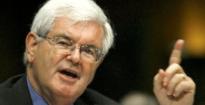Pawlenty and Gingrich Lead in Iowa Cash
 U.S. News reports:
U.S. News reports:
Those who say that actions speak louder than words need look no further than Iowa for proof. While none of the top Republican 2012 presidential prospects has announced an intention to run, many are doing early due diligence in the Hawkeye State. In August, former House Speaker Newt Gingrich and Minnesota Gov. Tim Pawlenty visited the state fair. Former Arkansas Gov. Mike Huckabee and Mississippi Gov. Haley Barbour also made recent trips, and former Alaska Gov. Sarah Palin swung through the state last weekend to promote her new book. These potential candidates and others have also cultivated Iowa GOPer goodwill with 2010 state-level campaign contributions. [See photos of Sarah Palin and her family.]
According to the Iowa Ethics and Campaign Disclosure Board, potential GOP candidates spent hundreds of thousands of dollars on state politics in the 2010 election cycle. American Solutions, a political action committee founded and chaired by Gingrich, contributed $107,500 to Iowa politicians and the state party. Pawlenty's Freedom First PAC donated $82,000 in the state, and former Massachusetts Gov. Mitt Romney gave $50,100. Other possible presidential hopefuls spending on 2010 Iowa elections included Huckabee, who dropped $15,500; Palin, with $15,000; Barbour; South Dakota Sen. John Thune; former Pennsylvania Sen. Rick Santorum; and Indiana Rep. Mike Pence. [See where Thune's campaign cash comes from.] Iowa's February 2012 caucuses will precede all other nominating contests, as has been the case since 1972. An Iowa win can mean a significant campaign head start. Since 1972, the winners of 9 of the 15 Iowa caucuses not involving incumbents have been the parties' eventual nominees, though a strong second-place showing can also boost a candidate.
Cary Covington, professor of political science at the University of Iowa, says that contributing to state officials' campaigns can go a long way toward mobilizing Republican voters. "You need the support of the party at the local level," says Covington. "Getting people to come out on a cold winter night isn't easy, and [state-level politicians] are the people who have the connections and the organization to do that."

